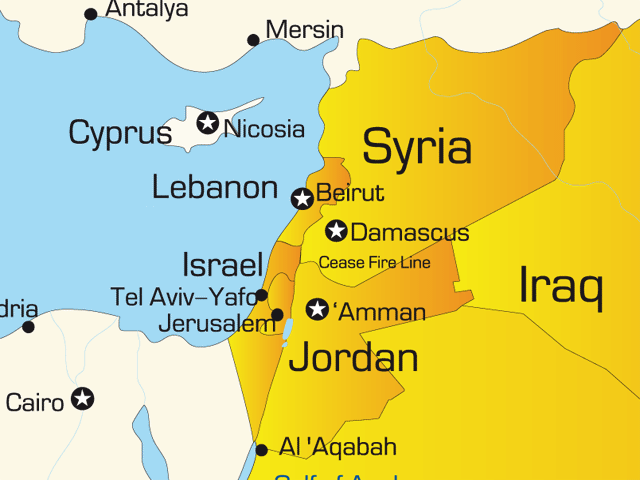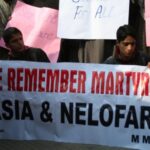The concept of the Asian Century is taking its roots in the global dynamics. Not only in economic terms – as Asia has been playing a key role in the global economy since the last two decade – but more so in geopolitical and geostrategic terms. Asia is the center stage of global politics, making it the most underlying and strategically potent military zone in the world. The uncertainty of regional politics, owing to the heavy penetration of Western hegemony, makes the region highly volatile and susceptible to high intensity conflicts. Post 9/11, the Middle East and the South Asian region is witnessing a change in the traditional strategic blocks in contemporary times. New alliances with proposed regional blocks are emerging, while the existing ones are going through a complete reshape. American war adventurism is on the cusp of instigating new wars in the region whilst shutting other theaters, in a desperate attempt to salvage some pride.
The deep anarchy and chaos in Asia is unprecedented in history, instigated by the Western powers to gain military significance and, most importantly, to ensure their permanent hegemony around the world. However, the tide of history may turn against the U.S., with some major geostrategic changes around the corner that may eventually doom the sun of the U.S. completely and give way to a new horizon for the Eastern civilization
Pakistan and Asia
Beginning with the Pakistan perspective within the region of Asia; Pakistan is passing through one of the worst phases since its inception, fighting the most ruthless existential war ever. And the apprehensions are that it may intensify post May 11 elections – which we have already started witnessing during the elections. These are considered the most critical and decisive elections in Pakistan’s unpredictable chronicle or, optimistically, it may drive the country from misery to glory. However, surprises unfolding in the former case can’t be ruled out either. In any of the two cases, the future of the Muslims residing in Pakistan and the region in general will linger on the outcome of the polls. Besides the elections in Pakistan, the U.S. withdrawal from Afghanistan, the U.S.-Iran relations, the Syrian conflict, the Indo-U.S. strategic partnership, etc., will bring a major paradigm shift in the policy developments that will then drive the national interests of the different countries involved, mainly belonging to the Middle East and South-East Asia. It is the right choice of policy and the right path, at this juncture of history, which will decide the fate, for the next few years, of the inhabitants of these regions.
The importance of the of Pakistani elections can be understood from the fact that a strong government in Pakistan might be a permanent death blow to the stakeholders with particular vested interests in the region. For the US and its allies, it is very important that they might keep Pakistan on their side for a safe exit strategy, since Pakistan has a key role to play in bringing some sort of reconciliation between the irrefutable Taliban and the American allies. Pakistan’s policy makers and strategists are playing their moves carefully; perhaps they might be able to pull out a deal this time, unlike the 80s, when Pakistan and Afghanistan were left behind to ruin the fruits of victory. Americans are wary of their $80bn hardware military equipment, which is a task that cannot be accomplished without negotiating a comprehensive deal with the main stakeholders of this conflict. In fact, all the neighbouring countries of Afghanistan ought to play a vital role in the formation of an interim government, acceptable to all groups, rather than a fragile one, keen on taking India’s help instead of finding solutions within its country. If President Karzai will not learn the lessons from the past, the history of the post-Soviet withdrawal is already hammering at the doors.
Moreover, a shrewd government in Islamabad would also deter any plan of the US or its allies to start another theater in the surroundings of Pakistan, due to the thin presence of the US forces in the vicinity.
The recent visit of the Chinese Premier and the offers from old friends like Saudi Arabia, the official functionality of the operations of Gwadar by the Chinese, and the change in America’s policy in WOT are a few indicators that tell us that Pakistan can enjoy in the next Asian Century; but only if it plays well.
Syria and the Middle East:
Meanwhile, the developing scenario of Syria is looking extremely hostile to Assad and even more worrying for Russia, as it loses a major strategic ally in the region – the only viable route for the Russians’ access to the warm waters of the Gulf. With a proposed peace plan on the tables, and direct intervention of Iran and Hezbollah being – perhaps – one of the key reasons, President Assad is now facing a backlash even from the neutral players of the Muslim world due to the sectarian bias that is now plaguing the region with all its destructive powers. Moscow, aware of this fact, is looking towards Pakistan for strategic ties and to hamper the Western objectives in the region. From these perspectives, it’s easy to comprehend the Pakistan Army Chief’s recent visit to Russia, and prior to that, the cancelled visit of President Putin in mid-2012. Although the fall of Assad will certainly isolate Iran, but it may still survive the American onslaught if the above scenario unfolds more quickly. It’s very likely that Iran’s tension with the West reaches to its climax, either peacefully or, as they say, ‘Might is right’, within the next 1 year. But during and prior to this period, Iran has to strengthen its relations with Pakistan (the signing of the Iran-Pakistan gas pipeline is one such step), Turkey, China and Afghanistan. A stronger defence and economic collaboration between Pakistan-Turkey-Iran shall also significantly choke any vested designs in the region. India, despite all the bravado of bilateralism and convergence of strategic interests, is abandoning the Asian block; and sailing in the sinking boat of America, it’s acting as a bulwark against China, leading to severe friction with the regional players. The recent Chinese incursion finds its genesis in the tussle aforementioned. India must shun this scavenger foreign policy and sincerely cooperate for the peace and stability of the region. Pursuing the same policy will completely dislodge and isolate india in the region, especially in times of war, as a lone power surrounded by various nuclear armed nations.
It must be kept in mind that Russia or China isn’t the replacement for America in any case, in fact, we should not act upon the whims and wishes of Washington nor Moscow nor Beijing either. Economic cooperation should be upheld with all the nations on the basis of mutual respect and dignity based on our own national interests. The Muslim nations should develop a regional strategic consensus, to counter the political, economic, cultural and military onslaught of the West, primarily aimed at the Muslim societies. In addition, Pakistan and Iran in particular should join the Asian security block – the SCO (Shanghai Cooperation Organisation), established by Russia and China to neutralise the NATO threat in the region. Contrary to the old fashioned regional wars, the future wars will be fought on power block axis, hence the Asian countries must develop a strong power block to neutralise any hostile political, cultural and military threat.
The dream of an Asian Century is dawning upon us as an opportunity; the new government is going to launch its programs in a few days, and it should be kept in mind, that no internal security or stability in any domain is possible, unless we are able to secure our national interests by the strategic gains that are knocking on the doors of Pakistan.








